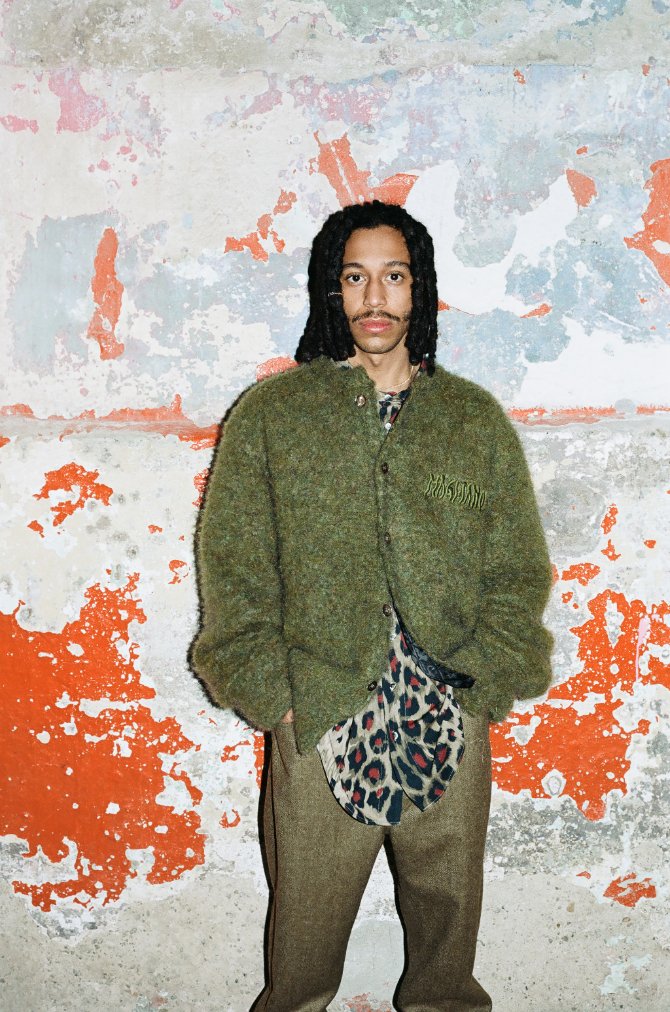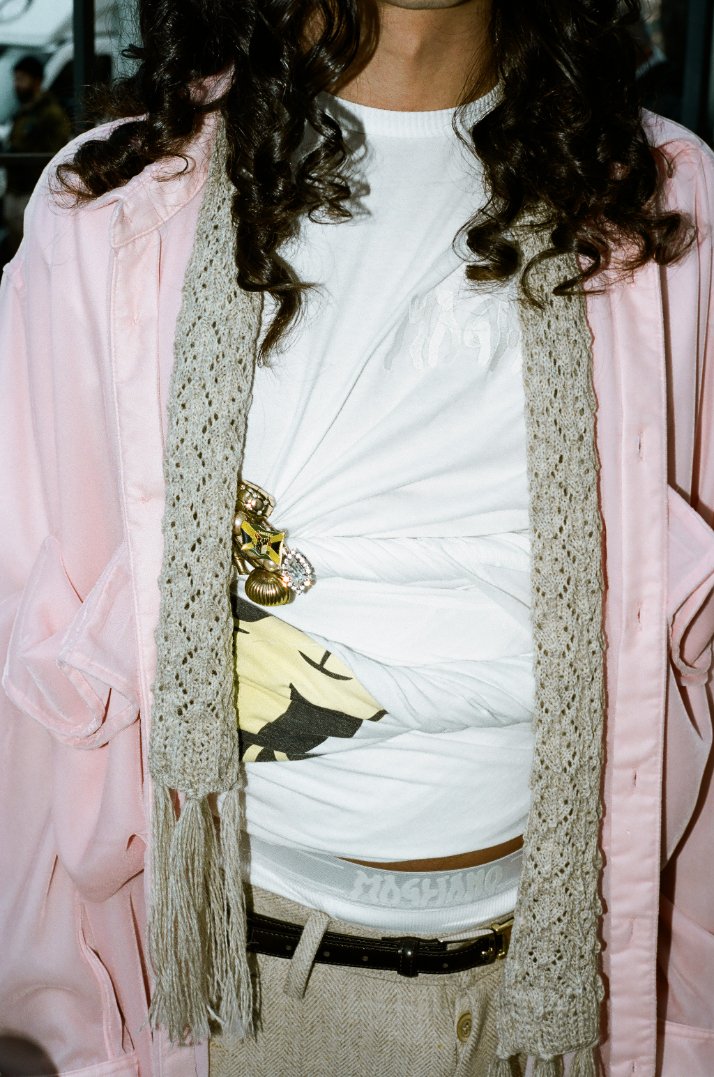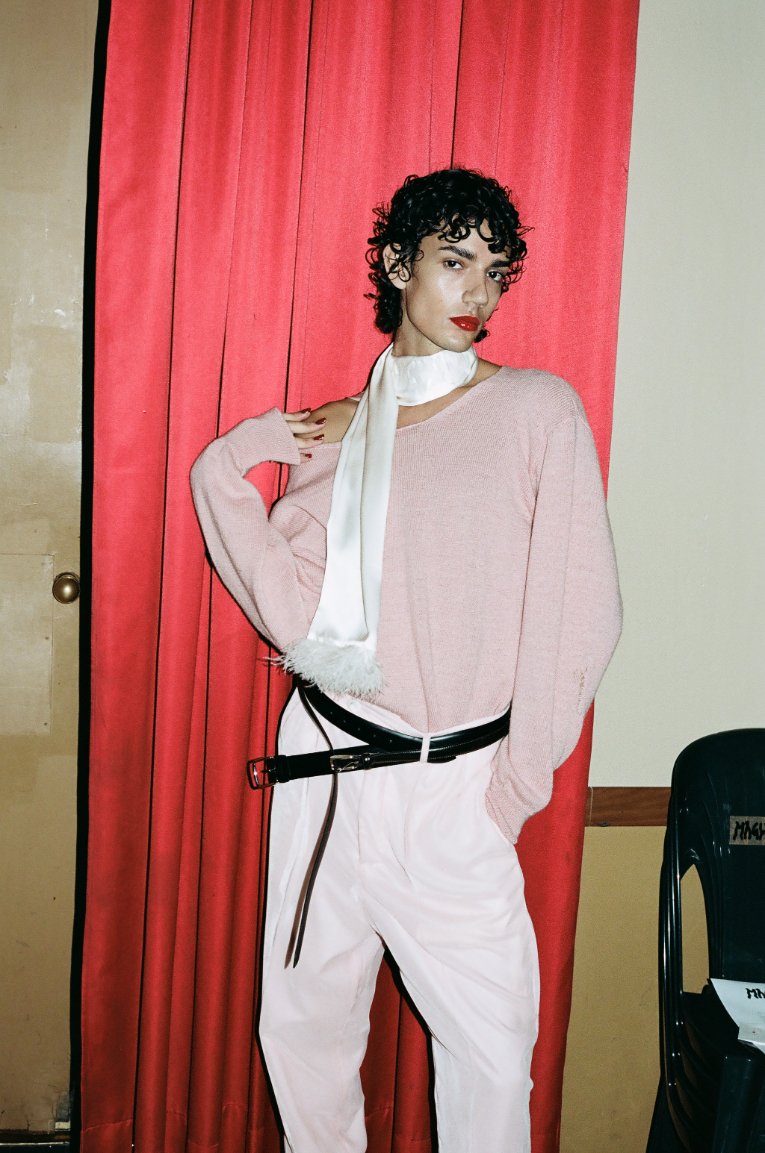interview by Janna Shaw
photographs by Pavel Golik
I once dreamt of Luca Magliano. I had no idea what he looked like; he appeared veiled but in no way sinister. In one of Magliano’s earlier video presentations, a poem is recited, a sonnet with lines dedicated to each garment displayed.
“Out of Saint Teresa of Avila’s Chanel coat I stole one dollar to gift to my golden Wagner jacket.” After this display of romance, I wandered about my own closet, singing praises sweetly and theatrically to my own favorite pieces. Something poignant to this act.
Luca Magliano’s self-titled fashion brand is described as “Quintessentially Italian” and “An Emotional Anthropology”. Since its establishment in 2016, the brand’s collections have unfolded as a personal reflection of the vast imagination of Magliano, who derives inspiration from the works of artists and filmmakers such as Luchino Visconti, as well as his own emotions, encounters, curiosities, and experiences. We spoke with the emerging designer about his FW 22/23 collection and his celebration of solitude and melancholia. We speak about his love for Italy and my love for Italians, we discuss sleep and what follows it. We don’t talk much about clothes. We decide to let those speak for themselves.
JANNA SHAW: I'd like to start this off right by jumping straight into your zodiac sign. What is it and what does it say about you?
LUCA MAGLIANO: Capricorn, a goat with the tail of a fish, equally attracted by altitude and abyss. Totally me.
SHAW: Your current F/W 22 collection was staged with beds: dark, lonely, quiet. It seems you derive inspiration from the subconscious state. Has the course of your life thus far been fairly solitary and shadowy, or is this a newfound stage of life that you’re exploring?
MAGLIANO: Melancholy has been a good half of my nature since forever, now I feel some kind of urge to celebrate it. These last years I have experienced a very precise kind of loneliness that could be contained only in a sort of perpetual nocturnal pilgrimage. That’s something I wanted to talk about in this show, because I think it’s something that affects many people. Someone said that the clothes in this show have a sort of curative action on those who wear them, as to protect them from a curse. I think this is very true. Design has to do with method, Magliano’s method is analogical.
SHAW: Do you have a bedtime routine? What about morning?
MAGLIANO: I love the moment when I go to bed and I hate to wake up in the morning. Every awakening is long and traumatic, while falling asleep is sweet and immediate. The first thing that I do in the morning is light up a cigarette, I know it’s gross. At night in bed, I usually read, sometimes a lot, sometimes a few words. I force myself not to look at the time because it stresses me out. If falling asleep becomes hard because there is something that scares me about the day after, I listen to audio books: someone reading to you is the most beautiful thing.
SHAW: When I mention ‘fantasy,’ where do your thoughts first go?
MAGLIANO: Sex.
SHAW: You are very proud of your Italian heritage, and find great inspiration from Italy (specifically your hometown of Bologna) for your collections. I dated an Italian from neighboring Modena. Best lover of my life and the greatest taste in food. What parts of being Italian really resonate with you? Does this shift with time? What is your favorite Italian dish?
MAGLIANO: When I was younger I would have done anything not to belong where I was. Part of that feeling came from curiosity for sure, but part of it was because I was in a big hurry to flee from unfinished business. My love for Italy has matured over time, and simultaneously with my love for myself, for my family, and its roots. The thing that I love the most about being Italian is the sense of exaggeration which is the quintessence of the anti-bourgeois ethos. My favorite Italian dish is cinema. Of course food is good but cinema is better. In Bologna every summer there is this incredible open air cinema that gives great classics and beautiful new d’essay releases, and it’s free for everyone. It’s always packed. While I’m writing this, I’m grieving the loss of the most brilliant Italian actress ever, Monica Vitti.
SHAW: What books and artworks are you currently diving into? Feel free to include any other things that have been sparking your delight as well.
MAGLIANO: Near to The Wild Heart and Agua Viva by Clarice Lispector, The Faggots And Their Friend Between The Revolution by Larry Mitchell. An essay by the Bolognese intellectual and activist Helena Velena called “Dal Cybercex Al Transgender”.
SHAW: What are you like in love? Dare I ask how you are in heartache?
MAGLIANO: Joyfully spiteful in the first case, silently edgy in the latter.
SHAW: Shapes or fabrics?
MAGLIANO: There is no shape without fabric, so I would say the latter. But nudity is the best because it does not involve any of those heavy burdens.
SHAW: Pragmatism or romance?
MAGLIANO: Either, as long as it is heroic and driven by bravery.
SHAW: Favorite flower?
MAGLIANO: Poppy.
SHAW: What is the last thing you were gifted?
MAGLIANO: A little bag made out of can tabs.
SHAW: What was your last handwritten note?
MAGLIANO: “Ricorda di chiedere scusa a Rafa” (Remember to apologize to Rafa).
SHAW: May I be so bold as to request a line of poetry? It can be your own, or a line that sticks in your mind.
MAGLIANO: I choose this one by Sandro Penna, an extraordinary poet and gay hero:
Io vivere vorrei addormentato
entro il dolce rumore della vita.
( I would like to live asleep
within the sweet noise of life. )









